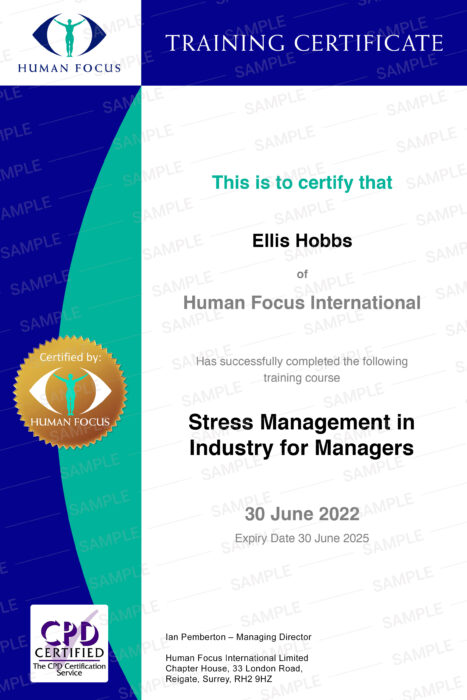Stress is a common hazard in industrial work environments that can affect employees’ physical and psychological well-being. This harm can result in increased absenteeism, reduced productivity and high staff turnover, limiting overall business performance.
This online training programme explores the manager’s role in managing stress within an industrial setting and offers strategies to effectively support employees. The course also empowers managers to take proactive measures to prevent stress and ensure optimal working conditions.
Stress-related absence from work is a significant problem for employers. There were 914,000 cases of work-related stress, depression, or anxiety in the UK in 2021/22, resulting in 17 million lost working days, according to the Health and Safety Executive (HSE).
Looking at specific industries, Statistics from AXA’s Stress Index 2018 revealed that workers in industries including engineering, haulage and construction were some of the most stressed in the UK. Employees in these industries reported feelings of stress at least once in a typical work week and at rates far above other sectors such as education, IT and business services.
In fact, the latest data from the Office for National Statistics shows that construction workers are nearly four times more likely to commit suicide than those in other sectors, emphasising the pressing need to address stress-related issues in this industry.
These concerning figures highlight why employers must take steps to manage stress by ensuring better working conditions and undertaking thorough risk assessments. To achieve this, managers need the knowledge and skills to identify the signs of stress in their employees. They must also know how to implement stress management strategies and take a proactive approach to prevent sources of stress or anxiety in the workplace.
According to the Health and Safety at Work Act 1974 and the Management of Health and Safety at Work Regulations 1999, employers are legally responsible for ensuring employees’ health and safety at work. This duty includes minimising the risks associated with stress-related illnesses or injuries.
Employers must ensure risk assessments account for potential workplace stressors and lead to effective control measures that minimise the impact of stress on their employees. Managers are most likely to undertake these risk assessments and assume responsibility for workplace stress management so must be properly equipped to effectively fulfil these duties.






